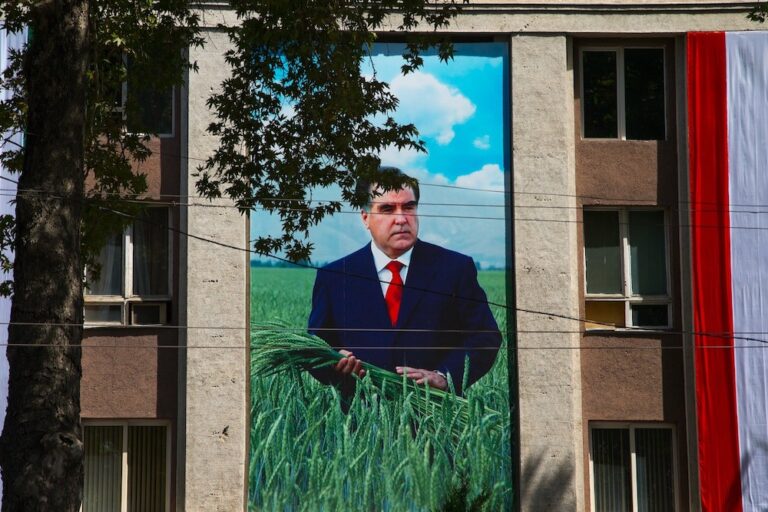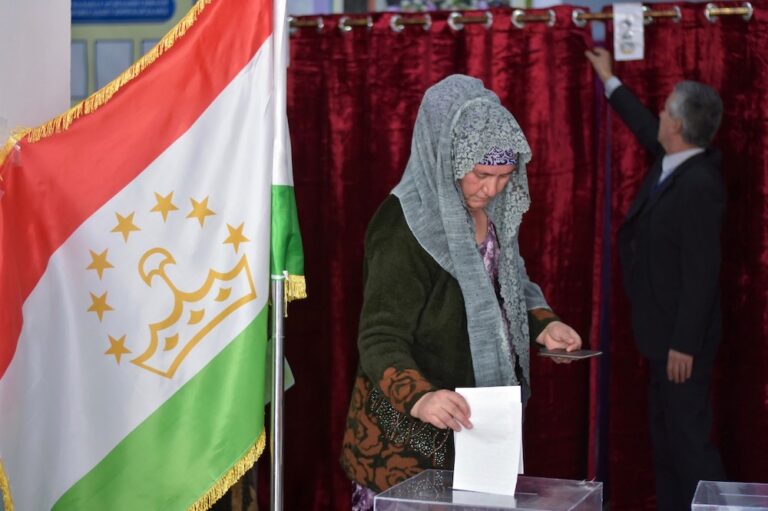"In 2024, the Tajik government reinforced its crackdown on dissent, jailing public figures, journalists, and bloggers. It also sought the deportation or extradition from other countries of people linked to a banned opposition party" - HRW
This statement was originally published on hrw.org on 16 January 2025.
In 2024 the Tajik government reinforced its crackdown on dissent, jailing public figures, journalists, and bloggers. It also sought the deportation or extradition from other countries of people linked to a banned opposition party.
There has not been any independent investigation or accountability for the deadly government crackdown on peaceful protesters in the Gorno-Badakshan Autonomous Oblast (GBAO) in 2021 and 2022. Members of the Pamiri ethnic group, people resident in the GBAO, continue reporting high levels of harassment and pressure from the authorities.
Women’s bodily autonomy came under attack in 2024 with authorities targeting both secular style of clothing and religious, while domestic violence remained decriminalized.
Transnational Repression
In 2024, Tajik authorities sought the detention, deportation, or extradition of several members of Group 24, a banned Tajik opposition movement, living in Lithuania, Poland, and Türkiye. In April 2024, Sulaimon Davlatov, a Group 24 member, was detained in Lithuania, but later released and not deported. In February and March, two senior figures of Group 24, Nasimjon Sharifov and Sukhrob Zafar, disappeared in Türkiye. They later resurfaced in Tajikistan in detention, with signs of torture and ill-treatment, and were sentenced to 20 and 30 years in prison, respectively, after a closed trial on unpublished charges. Group 24’s leadership stated they may have been charged with public calls for violent political change. Komron Khudoydodov, brother of former Group 24 activist Shabnam Khudoydodova, left Poland, where he was living, for a third country amid fears of being deported to Tajikistan.
Several EU countries have previously returned, or threatened to return, Tajik asylum seekers despite the risk of imprisonment and torture upon their return. In November, Germany deported Dilmurod Ergashev, a Tajik opposition activist, after refusing his asylum claim. He was detained immediately upon his arrival and provisionally detained for two months by a city court in Tajikistan.
Repression of Civil Society
Over the summer Tajik authorities conducted a series of arrests of a handful of prominent figures, including Shokirjon Hakimov, a human rights lawyer, publicist, and deputy chairman of the opposition Social Democratic Party of Tajikistan. The detainees, former and current politicians, are charged with high treason for allegedly plotting to seize power. Their access to legal representation has been severely limited, with their lawyers unable, at time of writing, to meet their clients. Hakimov’s arrest is especially troubling, as he is one of few remaining expert voices speaking about human rights violations in the country.
Although the government’s en-masse closures of many nongovernmental organizations was completed in 2023, the remaining organizations have reported continued pressure to drop work on sensitive human rights issues. Several human rights defenders told Human Rights Watch that they had left the country, as they were unable to continue their work inside Tajikistan.
Following the violent dispersal of peaceful demonstrations in the GBAO region in 2021 and 2022, in August, the Tajik authorities arrested 27 residents of the Yazgulom community in the region. They are suspected of being members of the Ansarullah Islamic group banned in Tajikistan.
Political Prisoners
Leaders and members of the banned Islamic Revival Party of Tajikistan party previously imprisoned on long or life prison sentences remain behind bars, despite continued international calls for their release, including the release of older prisoners on humanitarian grounds. In September, an 80-year-old former member of IRPT, Zubaidullo Roziq, was returned to prison having been hospitalized for a heart condition in August.
Freedom of Expression
Freedom of expression continues to be severely limited in Tajikistan, both for journalists and ordinary citizens. At time of writing, seven journalists were in prison for their critical reporting, including Ulfatkhonim Mamadshoeva, who, in 2022, was sentenced to 21 years on trumped-up charges of organizing the protests in the GBAO region.
At time of writing, another journalist from the GBAO, Anora Sarkorova, who has reported on the crackdown in the region, was under criminal investigation on charges of public calls to extremist activities.
In February, the Supreme Court sentenced three writers to prison terms of between one and six-and-a-half years for writing, editing, and publishing a book highlighting societal challenges, including corruption and migration. The book was ordered to be removed from bookstores.
In August, journalist Ahmad Ibrohim, chief editor of independent weekly newspaper “Payk,” reportedly was arrested on bribery charges related to his newspaper’s re-registration. In the past, such arrests have been shown to be politically motivated.
Freedom of Belief
In June, Tajik president Emomali Rahmon brought into force amendments to the “traditions” law, which bans clothing “foreign to the national culture” in public spaces, effectively prohibiting hijabs and other religious attire. This follows months of campaigns by officials urging women and girls to wear headscarves in the “Tajik” way and forcing men to shave their beards. Media have reported incidents of women and girls being denied hospital entry for not wearing the approved style of head covering, forcibly taking individuals to police stations for fingerprinting and photographing, and detaining men to shave their beards at their own expense. Tajikistan has previously enacted restrictions on circumcisions, baby naming rituals, weddings, religious pilgrimage ceremonies, and funerals.
Women’s and Girls’ Rights
Despite widespread awareness of domestic violence in Tajikistan, with studies suggesting that at least 50 percent of women experience abuse in their lifetime, domestic violence is still not criminalized. In July 2024, a senior government official reported that a draft law criminalizing domestic violence was in development, although it was unclear when the bill would be submitted to parliament.
In July, Tajik law enforcement detained two young women for Instagram posts in which they pose wearing shorter dresses, claiming it was “offensive to the honor” of Tajik women and mothers. The police released them after a “preventive” conversation but posted photographs from the young women’s accounts on the police social media platform without anonymizing their faces or account details. Later, the Tajik Ministry of Culture published examples of traditional national clothing “recommended” for women and girls.
In a positive step, Tajik authorities in January reduced the number of professions prohibited to women and girls from 334 to 194 across 22 economic sectors, citing improved working conditions and increased access to professions for women. However, restrictions remain in transport, underground work, and high-altitude jobs – all highly paid sectors.
Labor Migrants
Tajik migrants working in Russia have faced increased harassment since the March attack on Crocus City Hall in Moscow, in which Tajik nationals were implicated as organizers. In the first six months of the year Russia deported 17,000 Tajik migrants, 6,000 more than in all of 2023. In February, some Tajik migrants reported being forced to join the Russian military or risk being deported with their families and banned from returning to Russia.
Conflict at the Kyrgyzstan-Tajikistan Border
By September, 94 percent of the border between Kyrgyzstan and Tajikistan had been delineated, although the remaining 6 percent was reported to include the most difficult sections, located around the Vorukh enclave and villages of Ak-Sai and Kok-Tash. The armed conflict of September 2022 that left 37 people dead, including 5 children, was concentrated in these locations. Both countries committed apparent war crimes in the conflict, leading to the deaths of civilians and the destruction of civilian property, including schools, according to a report by Human Rights Watch in 2023.



